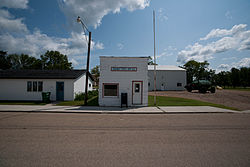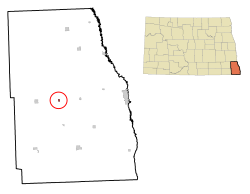Barney, North Dakota (original) (raw)
City in North Dakota, United States
| Barney, North Dakota | |
|---|---|
| City | |
 Post office in Barney Post office in Barney |
|
 |
|
| Coordinates: 46°15′58″N 97°00′04″W / 46.26611°N 97.00111°W / 46.26611; -97.00111 | |
| Country | United States |
| State | North Dakota |
| County | Richland |
| Founded | 1899 |
| Area[1] | |
| • Total | 0.18 sq mi (0.48 km2) |
| • Land | 0.18 sq mi (0.48 km2) |
| • Water | 0.00 sq mi (0.00 km2) |
| Elevation[2] | 1,034 ft (315 m) |
| Population (2020) | |
| • Total | 40 |
| • Density | 217.39/sq mi (83.95/km2) |
| Time zone | UTC-6 (CST) |
| • Summer (DST) | UTC-5 (CDT) |
| ZIP code | 58008 |
| Area code | 701 |
| FIPS code | 38-04940 |
| GNIS feature ID | 1035922[2] |
Barney is a city in Richland County, North Dakota, United States. The population was 40 at the 2020 census.[3] Barney was founded in 1899. It is part of the Wahpeton, ND–MN Micropolitan Statistical Area.
According to the United States Census Bureau, the city has a total area of 0.16 square miles (0.41 km2), all land.[4]
Historical population
| Census | Pop. | Note | %± |
|---|---|---|---|
| 1960 | 115 | — | |
| 1970 | 81 | −29.6% | |
| 1980 | 70 | −13.6% | |
| 1990 | 79 | 12.9% | |
| 2000 | 69 | −12.7% | |
| 2010 | 52 | −24.6% | |
| 2020 | 40 | −23.1% | |
| 2021 (est.) | 42 | [5] | 5.0% |
| U.S. Decennial Census[6]2020 Census[3] |
As of the census of 2010, there were 52 people, 24 households, and 14 families residing in the city. The population density was 325.0 inhabitants per square mile (125.5/km2). There were 28 housing units at an average density of 175.0 per square mile (67.6/km2). The racial makeup of the city was 98.1% White and 1.9% from two or more races.
There were 24 households, of which 20.8% had children under the age of 18 living with them, 54.2% were married couples living together, 4.2% had a female householder with no husband present, and 41.7% were non-families. 37.5% of all households were made up of individuals, and 25% had someone living alone who was 65 years of age or older. The average household size was 2.17 and the average family size was 2.71.
The median age in the city was 49 years. 15.4% of residents were under the age of 18; 11.5% were between the ages of 18 and 24; 17.2% were from 25 to 44; 40.5% were from 45 to 64; and 15.4% were 65 years of age or older. The gender makeup of the city was 48.1% male and 51.9% female.
As of the census of 2000, there were 69 people, 25 households, and 17 families residing in the city. The population density was 432.5 inhabitants per square mile (167.0/km2). There were 28 housing units at an average density of 175.5 per square mile (67.8/km2). The racial makeup of the city was 100.00% White.
There were 25 households, out of which 36.0% had children under the age of 18 living with them, 56.0% were married couples living together, 8.0% had a female householder with no husband present, and 32.0% were non-families. 16.0% of all households were made up of individuals, and 12.0% had someone living alone who was 65 years of age or older. The average household size was 2.76 and the average family size was 3.35.
In the city, the population was spread out, with 33.3% under the age of 18, 7.2% from 18 to 24, 21.7% from 25 to 44, 26.1% from 45 to 64, and 11.6% who were 65 years of age or older. The median age was 36 years. For every 100 females, there were 76.9 males. For every 100 females age 18 and over, there were 91.7 males.
As of 2000 the median income for a household was 36,875,andthemedianincomeforafamilywas36,875, and the median income for a family was 36,875,andthemedianincomeforafamilywas46,667. Males had a median income of 34,375versus34,375 versus 34,375versus19,375 for females. The per capita income for the city was $14,079. There were no families and 7.6% of the population living below the poverty line, including no under eighteens and 20.0% of those over 64.
- ^ "ArcGIS REST Services Directory". United States Census Bureau. Retrieved September 20, 2022.
- ^ a b U.S. Geological Survey Geographic Names Information System: Barney, North Dakota
- ^ a b "Explore Census Data". American FactFinder. United States Census Bureau. Retrieved July 17, 2022.
- ^ "US Gazetteer files 2010". United States Census Bureau. Archived from the original on January 12, 2012. Retrieved June 14, 2012.
- ^ "City and Town Population Totals: 2020-2021". United States Census Bureau. July 17, 2022. Retrieved July 17, 2022.
- ^ United States Census Bureau. "Census of Population and Housing". Retrieved October 31, 2013.